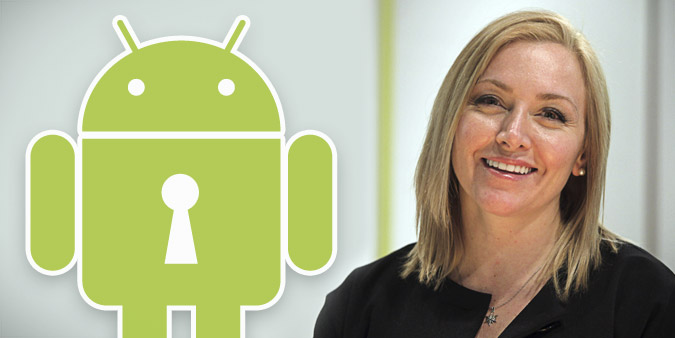Motorola Exec: iOS Security an 'Illusion,' Don’t Blame Skins for Slow Android Updates
Motorola's Christy Wyatt sounds pretty sick of hearing about the supposed airtight security of iOS. In fact, the senior vice president and general manager for Motorola's fairly young enterprise-mobile-device unit argues that Apple's platform provides a "false sense of security." That's not an easy argument to make at a time Google continues to pull malware-infested apps from the Android Market, but Wyatt insists that Motorola is doing more than the competition to make Android devices enterprise-friendly.
During an hour-long roundtable discussion with a small group of reporters, Wyatt also sounded off on NFC's chicken-and-egg problem; potentially designing rugged tablets for vertical markets; and what Android needs to do to be more competitive with the iPad. She also shed some light on why it takes so long for Android devices to get the latest software updates.
Here are the highlights:
Android versus iOS Security
"There's this sort of illusion that because the Apple App Store is curated…that they're somehow testing for security and that you can outsource all of your security concerns to Apple," said Wyatt. "And I think that's a pretty false sense of security. At the end of the day, the individual responsible for security is the IT organization."
Users Don't Want Dual-Personality Smartphones
According to Wyatt, solutions like Enterproid that provide both a consumer and business profile on the same device are too cumbersome for users. What Motorola is doing with 3LM, a company it acquired last February, is providing a security platform that allows IT managers to create blacklists and white lists of apps, as well as enable password enforcement and remote data wipe. Wyatt said Motorola "really believed in what they were doing because they provided fine-grain device management." HTC, LG, Sony, Pantech and Sharp also license 3LM technology.
Sign up to receive The Snapshot, a free special dispatch from Laptop Mag, in your inbox.
NFC Coming to Moto Devices
In answer to a question about why Motorola has been slow to adopt near-field-communications chips in its phones, Wyatt said "you will see NFC coming out in our products in not too distant future." She mentioned that adding NFC chips adds weight and cost to handsets, but the biggest hurdle has been the chicken-and egg issue surrounding mobile payments. With carriers, banks and other parties fighting over a piece of the pie, "the controversy around NFC between various constituents" is the biggest holdup.
Ice Cream Sandwich Helps, But Android for Tablets Still Needs Work
Wyatt attempted to explain why, if Android phones sell so well, Android tablets have flopped, noting that Google still has work to do in terms of making content consumption easier. "People see phones predominantly as communication devices that can also consume content. But people tend to see larger screens as content consumption first. The experience in terms of finding content, watching content and being able to buy it more seamlessly are all going to contribute to more adoption on the consumer side."
The Motorola VP also seems optimistic that Android Ice Cream Sandwich will help bridge the gap between phones and tablets. "Bringing the phone and tablet ecosystems together has to be able to provide a more robust ecosystem for tablet applications. That has to be one of the promises of Ice Cream Sandwich," Wyatt said. "That's the hope, that by bringing these two UIs together you solve a lot of the experience gaps between the two and the ecosystem gaps between the two, and you get to more of a shared experience."
"Life Ready" Rugged Tablets Could Be Coming
One reporter asked whether Motorola would consider making ruggedized tablets for specialized markets like healthcare and education. After all, Gorilla Glass will only take you so far. "We've done a franchise of phones that we refer to as Life Ready, which are a step up in terms of ruggedization," Wyatt said. She's referring to handsets like the Motorola Defy, which is water- and scratch-resistant, as well as dustproof. "It's conceivable to think that you would take tablets or other screen sizes and apply the same Life Ready franchise over time."
On Why Android Updates Take So Darn Long
Wyatt hears the complaints every day, but she also believes that most people don't understand the real reasons why Android phones are so slow to get the latest software. According to her, skinning the OS isn't the issue, it's the multitude of devices available on the market. One of the benefits of Motorola releasing fewer devices is that updates should come faster. Then again, it doesn't sound like it would hurt if Google gave device makers a little more notice.
'When Google does a release of software they do not release it for all the different hardware versions that are supported. So hardware is by far the long pole in the tent," Wyatt said. "They do the software for whatever phone they just shipped. The rest of the ecosystem doesn't see it until you see it. The clock starts ticking then. So you have a product that's in the market at the time you're getting the code for the first time. You have multiple chipsets, multiple radio bands, multiple countries. So it's a big machine to turn."


